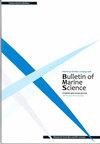Exploring relationships between gender and collective action in artisanal fisher associations of Central Chile
IF 1.5
4区 地球科学
Q3 MARINE & FRESHWATER BIOLOGY
引用次数: 0
Abstract
Artisanal fisher associations have experienced a shift towards gender inclusivity over the past decade. We used the social-ecological systems framework developed by Elinor Ostrom to explore relationships between gender and collective action. Questionnaires were used to determine (1) motivations to join an association, (2) socio-demographic information, (3) perceptions on key collective action dimensions around leadership and norms within the association, and (4) perceived social performance. Surveys targeted artisanal fisher associations in Chile with varying gender compositions: exclusively male members, exclusively female members, mixed-gender led by a man, and mixed-gender led by a woman. Our results show that women and men have distinct motivations to join an association. Women are primarily motivated by a sense of belonging, while men are mainly motivated by the possibility of an increase in income. Furthermore, associations comprised of women displayed higher valuations on leadership, entrepreneurship, and participation in activities. This likely led to the significantly higher performance of associations that incorporated women (either women-only or mixed gender) in efficiency (30.1%–40.3% higher) and cooperation (13.8%–30.8% higher). Our results extend the social-ecological systems framework towards understanding the role of gender in collective action for fisheries management and specifically contribute to build knowledge and implement novel policy which considers gender in artisanal fisheries in Chile.探讨性别与智利中部手工渔民协会集体行动之间的关系
在过去十年中,手工渔民协会经历了向性别包容性的转变。我们使用埃莉诺·奥斯特罗姆(Elinor Ostrom)开发的社会生态系统框架来探索性别与集体行动之间的关系。问卷调查用于确定(1)加入协会的动机,(2)社会人口统计信息,(3)对协会内部领导和规范的关键集体行动维度的看法,以及(4)感知的社会绩效。调查的对象是智利不同性别组成的手工渔民协会:纯男性成员、纯女性成员、由男性领导的混合性别协会和由女性领导的混合性别协会。我们的研究结果表明,女性和男性有不同的动机加入一个协会。女性的主要动机是归属感,而男性的主要动机是收入增加的可能性。此外,由妇女组成的协会在领导能力、企业家精神和参与活动方面表现出更高的评价。这可能会导致由女性(无论是纯女性还是男女混合)组成的协会在效率(提高30.1%-40.3%)和合作(提高13.8%-30.8%)方面的表现显著提高。我们的研究结果扩展了社会生态系统框架,以理解性别在渔业管理集体行动中的作用,并特别有助于建立知识和实施在智利手工渔业中考虑性别的新政策。
本文章由计算机程序翻译,如有差异,请以英文原文为准。
求助全文
约1分钟内获得全文
求助全文
来源期刊

Bulletin of Marine Science
地学-海洋学
CiteScore
2.90
自引率
6.70%
发文量
25
审稿时长
6-12 weeks
期刊介绍:
The Bulletin of Marine Science is a hybrid open access journal dedicated to the dissemination of research dealing with the waters of the world’s oceans. All aspects of marine science are treated by the Bulletin of Marine Science, including papers in marine biology, biological oceanography, fisheries, marine policy, applied marine physics, marine geology and geophysics, marine and atmospheric chemistry, meteorology, and physical oceanography. In most regular issues the Bulletin features separate sections on new taxa, coral reefs, and novel research gear, instrument, device, or system with potential to advance marine research (“Research Tools in Marine Science”). Additionally, the Bulletin publishes informative stand-alone artwork with accompany text in its section "Portraits of Marine Science."
 求助内容:
求助内容: 应助结果提醒方式:
应助结果提醒方式:


